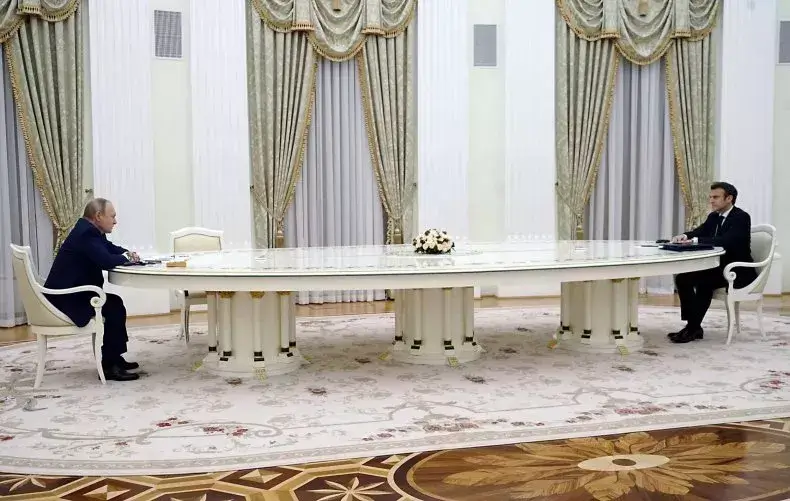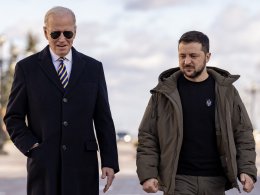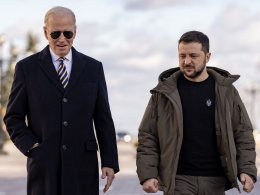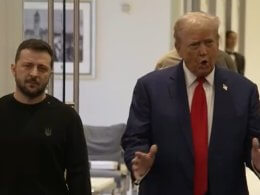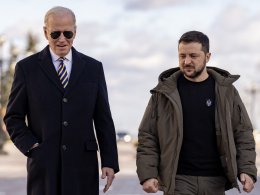Vladimir Putin's health is a subject of intense conversation inside the Biden administration after the intelligence community produced its fourth comprehensive assessment at the end of May. The classified U.S. report says Putin seems to have re-emerged after undergoing treatment in April for advanced cancer, three U.S. intelligence leaders who have read the reports tell Newsweek.
The assessments also confirm that there was an assassination attempt on Putin's life in March, the officials say.
The high-ranking officials, who represent three separate intelligence agencies, are concerned that Putin is increasingly paranoid about his hold on power, a status that makes for a rocky and unpredictable course in Ukraine. But it is one, they say, that also makes the prospects of nuclear war less likely.
"Putin's grip is strong but no longer absolute," says one of the senior intelligence officers with direct access to the reports. "The jockeying inside the Kremlin has never been more intense during his rule, everyone sensing that the end is near."
All three officials—one from the office of the Director of National Intelligence, one a retired Air Force senior officer, and one from the Defense Intelligence Agency—caution that the Russian leader's isolation makes it more difficult for U.S. intelligence to precisely assess Putin's status and health.
"What we know is that there is an iceberg out there, albeit one covered in fog," says the DNI leader, who communicated with Newsweek via email and requested anonymity to discuss sensitive matters.
"One source of our best intelligence, which is contact with outsiders, largely dried up as a result of the Ukraine war," says the DIA senior official. "Putin has had few meetings with foreign leaders," the official says, cutting off the insights that can sometimes be gained in face-to-face encounters. "Putin's isolation has thus increased levels of speculation."
"We need to be mindful of the influence of wishful thinking," cautions the retired Air Force leader. "We learned—or didn't learn—that lesson the hard way with Osama bin Laden and Saddam Hussein."
Horseback-riding, hockey-playing Vladimir Putin has been the image of masculinity and vitality for years, a persona carefully curated by official Moscow and one often used by Kremlin propagandists to contrast the Russian leader with his American counterparts.
Then came the very long table that Putin used in the Kremlin to record the photo ops of his important meetings, one that came to symbolize his paranoia and physical fear.
The table most recently was the venue for Putin's meeting with French President Emmanuel Macron on February 7, just two weeks before the Ukraine invasion. For the intelligence community, the long table and Putin's behavior with Macron became a baseline against which to measure the Russian president's decline.
"There was no shaking of hands, no warm embrace, and we noticed that," says the DNI leader. He said that French intelligence had many observations from the meeting and the trip to Moscow, declining to elaborate on what was reported back to the U.S. government.
Then came Putin's April 21 meeting with Russian Defense Minister Sergey Shoigu, this time at a small table, the hue all green and peaceful. Many focused on Shoigu, who had been missing from the public eye. But it was Putin who had largely been absent for much of the month, and he was far from a picture of health, slouching in his chair and gripping the table with his right hand.
Some observers inferred that the Russian leader had Parkinson's disease. Others insisted it was just his KGB weapons training, referring to his rigid stance and walk, always with the right arm ready to reach inside a jacket for a gun. The video was closely scrutinized by intelligence community analysts, some trained in remote diagnosis and others in psychiatry. Many pieces of intelligence were analyzed for the White House: the consensus was that Putin was ill and probably dying. He seemed to be putting on a good show. But perhaps the isolation of COVID had masked a decline that was only now more vividly being exposed.
The May 9 "Victory Day" appearance was next, where a noticeably bloated Russian leader sat slumped. Putin's health, and his inability (or reluctance) to declare victory in Ukraine went together. The U.S. intelligence community agreed that his situation was graver than previously thought, and his physical exhaustion was matched by Russia's own exhaustion.
Three days later, Ukraine's head of intelligence Maj. Gen. Kyrylo Budanov told U.K. Sky News that Putin was in a "very bad psychological and physical condition and he is very sick," adding that there were plans inside the Kremlin to overthrow the Russian leader.
A rumor that Kremlin security people had uncovered a Russian plot to assassinate Putin was confirmed at this time. The CIA and foreign intelligence services were picking up consistent stories of discord at the top of the national security ministries, as well as the desire on the part of Russian diplomats to defect to the west.
"Someone once seen as omnipotent was now mostly seen as struggling with the future, his own in particular," says the DNI leader.
When serious intelligence started to circulate about Putin's illness, U.S. leaders were cautioned not to jump to conclusions too quickly, reminded of examples of hot "intelligence" about Osama bin Laden and Saddam Hussein that shaped U.S. policy and then proved questionable.





